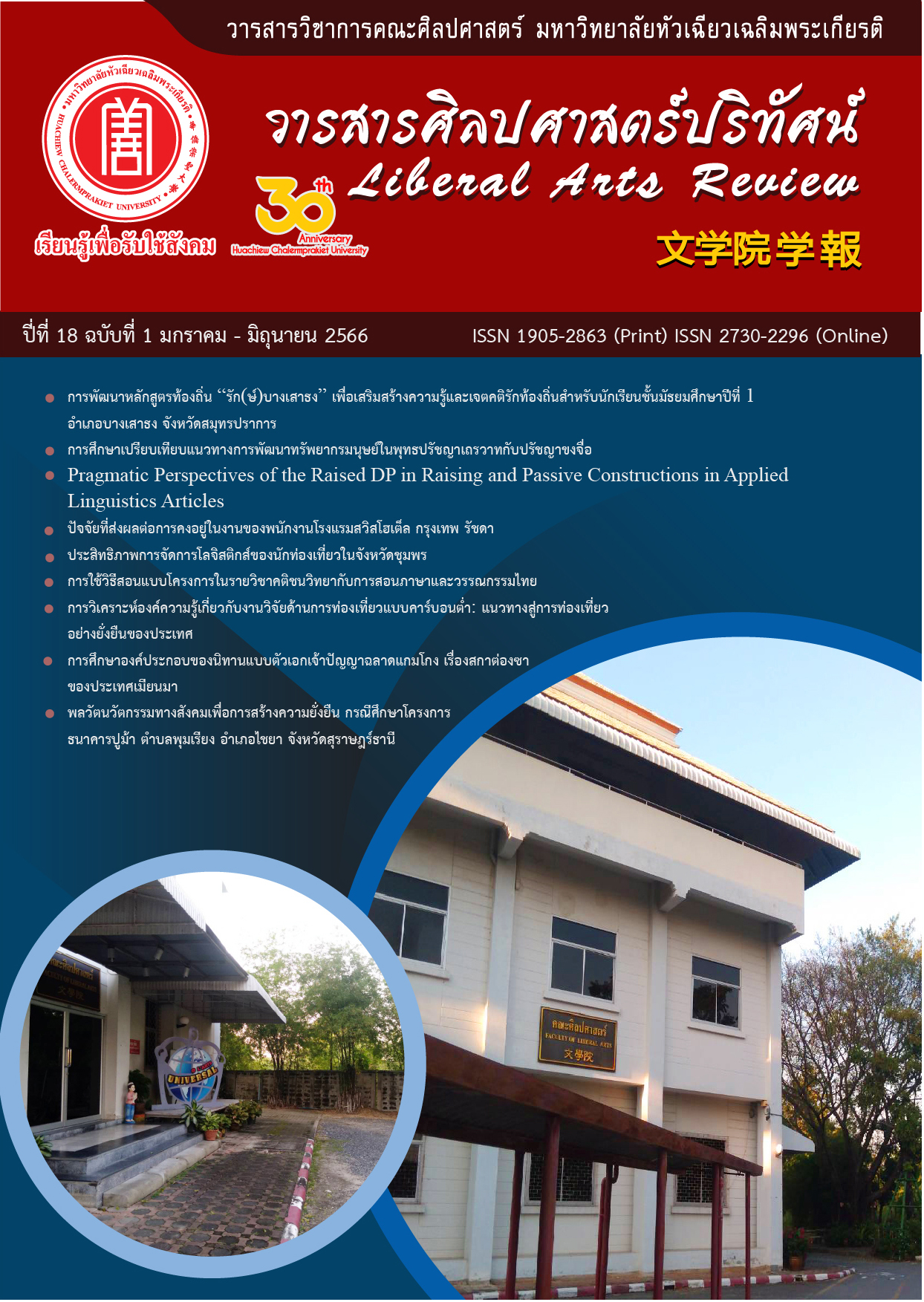A Comparative Study of Development Human Resources in Theravada Buddhist Philosophy and Confucius Philosophy
DOI:
https://doi.org/10.14456/lar.2023.2Keywords:
Development, Human Resources, Theravada Buddhist Philosophy, Confucius PhilosophyAbstract
The purposes of this research were to study and compare principles of human resource development in Theravada Buddhism and Confucian philosophy by using survey research methodology. The data were analyzed from the document and the results were presented in a descriptive analytical way. The results showed that the principles of human resource development in both philosophies were consistent in the essence. That was human resource development was a process of training and purifying life both physically and mentally to be perfectly connected with the surrounding environment of human beings with the aims of making everyone live happily together and helping each other to maintain a society of peace, unity and stability. The differences were found in details. In Theravada Buddhist philosophy, there was a complete life development process summarized according to the threefold principle, which was precepts, concentration, and wisdom, focusing on the achievement of development that is free from defilement and suffering. The Confucian philosophy, on the contrary, were focused on social mechanisms, education and tradition as training tools; to refine to perfection from a young age through close people and other people in society.
References
ญาณาธิป เตชะวิเศษ. (2557). พัฒนาการแนวคิดมนุษย์นิยมในทัศนะของตู้เหวยหมิง. (วิทยานิพนธ์ศิลปศาสตรมหาบัณฑิต). คณะศิลปศาสตร์ มหาวิทยาลัยธรรมศาสตร์, กรุงเทพมหานคร.
พระพรหมคุณาภรณ์ (ป.อ.ปยุตฺโต). (2553). พุทธวิธีแก้ปัญหาเพื่อศตวรรษที่ 21 (พิมพ์ครั้งที่ 20). กรุงเทพมหานคร: กรมการศาสนา.
พระพุทธโฆสาจารย์. (2531). วิสุทฺธิมคฺคสฺส นาม ปกรณวิเสสสฺส ปฐโม-ทุติโย ภาโค (พิมพ์ครั้งที่ 7). กรุงเทพมหานคร: โรงพิมพ์มหามกุฏราชวิทยาลัย.
มหาจุฬาลงกรณราชวิทยาลัย. (2515). พระไตรปิฎกภาษาบาลี ฉบับมหาจุฬาเตปิฏกํ 2500. กรุงเทพมหานคร: โรงพิมพ์การศาสนา.
มหาจุฬาลงกรณราชวิทยาลัย. (2539). พระไตรปิฎกภาษาไทย ฉบับมหาจุฬาลงกรณราชวิทยาลัย. กรุงเทพมหานคร: โรงพิมพ์มหาจุฬาลงกรณราชวิทยาลัย.
สุวรรณา สถาอานันท์ (แปลและเขียนบทนำ). (2562). หลุนอี่ว์: ขงจื่อสนทนา. กรุงเทพมหานคร: สำนักพิมพ์แห่งจุฬาลงกรณ์มหาวิทยาลัย.
Peimin, N. (2014). The Philosophy of Confucius. Michigan, USA: Crand Valley State University.
Wei-ming, T. (2012). A Confucian Perspective on Human Rights in Confucianism, Chinese History and Society. Singapore: World Scientific.
Downloads
Published
How to Cite
Issue
Section
License
Copyright (c) 2023 Liberal Arts Review

This work is licensed under a Creative Commons Attribution-NonCommercial-NoDerivatives 4.0 International License.
บทความที่ได้รับการตีพิมพ์เป็นลิขสิทธิ์ของวารสารศิลปศาสตร์วิชาการและวิจัย
ข้อความที่ปรากฏในบทความแต่ละเรื่องในวารสารวิชาการเล่มนี้เป็นความคิดเห็นส่วนตัวของผู้เขียนแต่ละท่านไม่เกี่ยวข้องกับมหาวิทยาลัยหัวเฉียวเฉลิมพระเกียรติ และคณาจารย์ท่านอื่นๆ ในมหาวิทยาลัยฯ แต่อย่างใด ความรับผิดชอบองค์ประกอบทั้งหมดของบทความแต่ละเรื่องเป็นของผู้เขียนแต่ละท่าน หากมีความผิดพลาดใดๆ ผู้เขียนแต่ละท่านจะรับผิดชอบบทความของตนเองแต่ผู้เดียว




